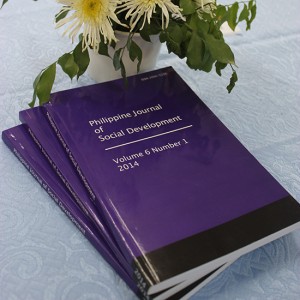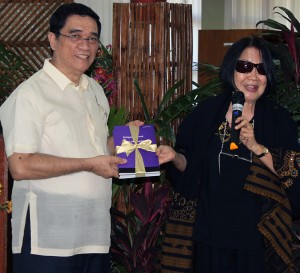By Benito V. Sanvictores Jr.

Vol 6, No. 1
(APR. 7) – Vol. 6, No. 1, 2014 of the Philippine Journal of Social Development (PJSD) is now available.
Published by the College of Social Work and Community Development (CSWCD) and edited by Dr. Rosalinda Pineda-Ofreneo, CSWCD professor and former dean, this issue contains five articles on the theme Social Solidarity Economy (SSE) as an Alternative Path of Development.
The five articles are “Rediscovering Social Solidarity Economy in Community-Based Supply Chains” by Benjamin R. Quiñones Jr., “Innovations in Community Social Enterprise Development: The Bohol PACAP FOCAS Experience” by Lourdes Marina Padilla-Espenido, “Livelihood Practices of Women in the Informal Economy: Forging Pathways Towards a Feminist Solidarity Economy” by Nathalie Africa-Verceles, “CSR and Social Solidarity Economy: Exploring Shared Responsibilities” by Anna Kristinna N. Palomo and “Sacada: A Look at the Hacienda System in the Philippines” by Editha Venus-Maslang.
SSE is a socio-economic order and new way of life that deliberately chooses serving the needs of people and ecological sustainability as the goal of economic activity rather than the maximization of profits under the unfettered rule of the market. It places economic and technological developments at the service of social and human development rather than the pursuit of narrow, individual self-interests, according to Quiñones.

to contributor Quiñones
Quiñones argues that if inclusive and sustainable development is to be achieved, the solidarity between local producers and local consumers of community-based supply chains must be strengthened. He cites the case of the free range chicken farm managed and operated by On Eagle’s Wings Development Philippines Foundation to illustrate how SSE is being utilized as an alternative model of development.
Quiñones is Chairman of the Asian Solidarity Economy Council (ASEC) or RIPESS (Réseau Intercontinental de Promotion de l’Économie Sociale Solidaire) Asia and founding convenor of the Asian Solidarity Economy Forum.
In her article, Espenido cites the Focused Community Assistance Scheme (FOCAS) of the Philippines-Australia Community Assistance Program (PACAP) in Bohol as “a strategy for inclusive development where people and non-government organizations utilize social enterprise to improve the well-being of the poor and increase their incomes, promote environmental protection and contribute to community economies.”
Espenido, a CSWCD faculty member, is the Project Manager of the CHR-AECID Fortaleza Project of the Commission on Human Rights (CHR) and the Agencia Española de Cooperación Internacional para el Desarrollo (AECID or Spanish Agency of International Cooperation for Development).
In her research, Verceles focuses on women in the informal economy, specifically self-employed/own-account micro-entrepreneurs and sub-contracted workers. Using three case studies, it investigates how livelihood projects which exemplify solidarity economics address and rectify the systematic subordination of women informal workers and build on their capacities for solidarity. It also identifies the gaps that need to be bridged towards a more explicit feminist solidarity economy.
Verceles is an assistant professor at CSWCD and the chairperson of the Department of Women and Development Studies.
Palomo reviews the evolution of corporate social responsibility (CSR) globally and within the Philippines. She discusses the contradictory nature of CSR and looks at how CSR and SSE can be harmonized through shared responsibilities in building social enterprises, local economies and sustainable communities. The paper also looks at CSR’s adherence to global human rights and labor standards, and the shift to corporate social accountability.
Palomo has over 20 years experience in the field of Social Work and is an assistant professor at CSWCD. She is currently pursuing her Doctorate in Social Development also at CSWCD.
Examining the situation of sacadas (plantation workers), Maslang uses the ‘empowerment’ theory – one’s capacity for critical thinking and understanding of structural inequalities. The sacadas in haciendas (plantations) have remained marginalized and disempowered over the past years owing to the transitory and migratory nature of their work, their lack of access to social protection and the socio-economic inequities that pervade in their work environment.
Maslang is a professor of Social Work at CSWCD. She earned both her BA Social Work and MA and PhD in Public Administration from UP.
The latest PJSD issue is now available at the CSWCD Admin Office and UP Press Bookstore at P300.— With report from CSWCD, photos courtesy of CSWCD
